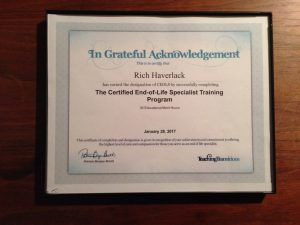
I’ve been asked how I know what to do as a hospice volunteer–how to behave and what to do. The short answer is that I’ve been trained.
The picture above is my re-certification certificate which just arrived at Good Samaritan Hospice.
At Good Samaritan all personnel coming into contact with patients must be formally trained, even volunteers like me. When I started as a volunteer, now some eight years ago, that meant reading a lot of material in a thick three-ring binder and then taking written tests. That, of course, was then. But now, naturally, the training is online and interactive. The program I was required to finish includes presentations, videos, text and unit-by-unit on-like tests to make certain that the material was absorbed.
It takes hours and hours to get through this online course, but I think the hospice is right to require it of volunteers. People at the final phase of life have enough trouble. Their families do too. And even for a volunteer like me, that first line of the famed Hippocratic oath holds as true as for any M.D or any R.N.: First, do no harm.
Anyone striving to help people as they transition from life needs to do it with alert, caring awareness of the immediate situation. What to do. What not to do. What to expect. How to assess. How to help without hurting. All of these things are made so much more important when life is short.
You can watch a video about the training program I’ve been through here
Of course, all hospices are different, and certainly required depth of training is one of those differences. If you are looking for a hospice, ask about training – of caregivers, staff, and volunteers too. If you are considering volunteering for hospice service, know that training can make all the difference in assuring the best experience for both you and those you seek to serve.
